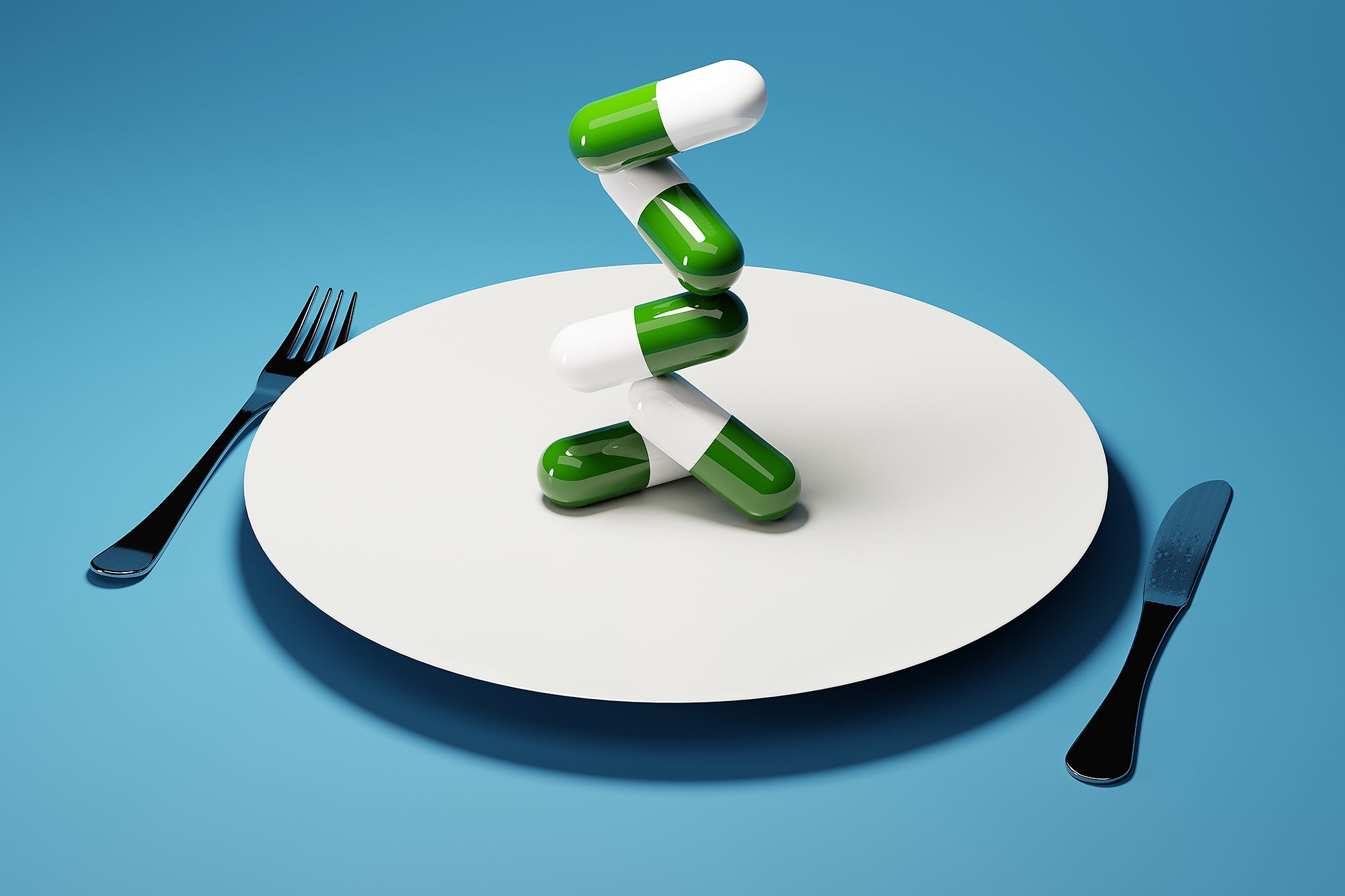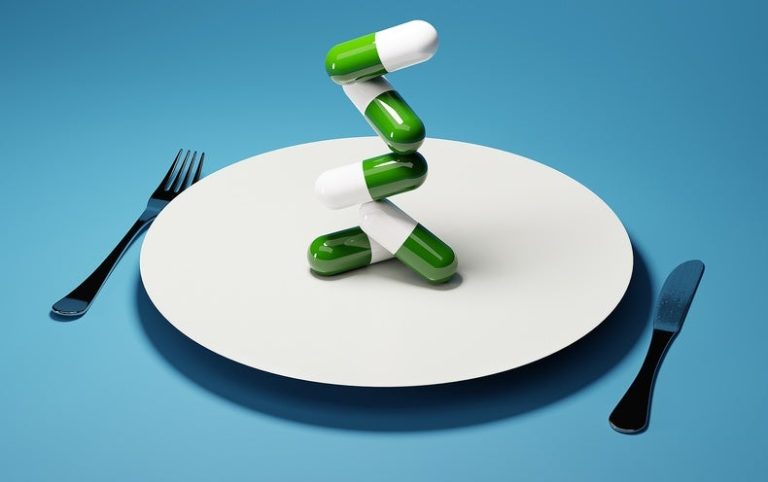
Social media is full of tips for gut health. Olive oil shots, prebiotics, probiotics and green powders are touted as remedies for digestive discomfort. Now, TikTok’s gut health evangelists are praising substances that have been dangerous mainstays of the weight-loss world: laxatives.
Recent reports claimed that laxatives were used as cheaper alternative to popular weight loss drugs like Wegovy. Laxatives often appear on the TikTok hashtag #guttok. It’s a place where people share their experiences with chronic intestinal diseases and where questionable remedies are also commonplace. Some videos claim that laxatives help people lose weight and feel less bloated, but research finds no evidence that laxatives cause lasting weight loss. Experts fear the proliferation of misinformation about laxatives could lead to eating disorders. “It’s absolutely a concern,” says Kristen Harrison, an expert on media effects on eating disorders at the University of North Carolina at Chapel Hill Hussman School of Journalism and Media. « It’s presented as a sort of legitimate, healthy lifestyle choice, as opposed to something that might become pathological or difficult to give up or that might lead to an eating disorder over time. »
Laxatives and eating disorders
Laxatives were used for centuries for important and legitimate medical uses, such as treating constipation or cleaning the intestines before surgery. Laxative abuse, however, has been associated with eating disorders such as anorexia nervosa and bulimia nervosa, often as a compensatory behavior to binge eating disorder.
“There could be physical or psychological discomfort just knowing that the patient just consumed a lot of calories,” says Janet Lydecker, a psychiatrist who focuses on eating disorders in young people. In other words, a binge eating episode often causes people to « purge » with laxatives, she says.
The laxative circulating on TikTok is mainly the one that contains polyethylene glycol 3350 (PEG). It is an osmotic laxative: it works by attracting water molecules to the colon, causing the formation of more liquid stools. Basically, it makes bowel movements easier. Most calories are absorbed higher in the digestive tract, long before food reaches the intestines, says David Levinthal, an assistant professor of medicine and a practicing gastroenterologist at the University of Pittsburgh Medical Center. “The main effect of laxatives is really in the colon,” he says. The idea that taking a laxative can speed up digestion and help maintain weight is therefore incorrect.
Only a handful of studies – mostly dating from the 1980s – have looked at the caloric effects of purging due to misuse of laxatives. All concluded that the effect was negligible. One study found that excessive use of laxatives only reduced caloric absorption. about 12 percent, and this resulted in up to 200 fluid ounces of diarrhea. This is dangerous because severe diarrhea can cause dehydration, which disrupts organ function in the long term. When taken at levels higher than recommended amounts, osmotic laxatives can also affect electrolyte balance: they deprive the body of the essential elements it needs to function. Improper use of laxatives over long periods of time can permanently damage the digestive system, leaving users suffering from chronic constipation. “As time goes on, you find out it’s kind of the devil’s bargain,” Harrison says.
The medical reason laxatives don’t work for weight loss may not be intuitive, especially for someone with an eating disorder, Lydecker says. Psychologically, these people want their stomach to be completely empty, for example after a binge, which may lead them to think, “Laxatives will do that; therefore, it must work,” says Lydecker. She says explaining that the drugs don’t work that way is usually enough to deter her patients.
In the United States, estimates suggest that the number of people with an eating disorder who have ever abused laxatives ranges from 10 to 60 percent. The range is so wide because almost all surveys rely on self-reported data and use different criteria to determine what constitutes laxative abuse.
Melissa Freizinger, associate director of the eating disorders program at Boston Children’s Hospital and assistant professor of psychology at Harvard Medical School, has treated people in the past who told her they would use the laxative to punish themselves for have eaten because the medicine would cause painful stomach cramps. Most knew it was not a good way to lose weight,” says Freizinger. She adds that some patients who used these medications would experience side effects such as increased fluid retention and bloating, which could lead to a « dangerous cycle » of using more laxatives.
Popularity of laxatives on social networks
The number of adolescents seeking treatment for an eating disorder at least doubled during the pandemic, and some research has shown that social media could be a major contributor. In one study, participants reported more frequent binge eating and laxative use in 2022 that before the start of the COVID pandemic. These behaviors were associated with greater exposure to weight loss-related content.
Eating very little or doing unusually rigorous exercise are common dangerous behaviors on social media platforms, says Diana Thiara, a clinical assistant professor of medicine at the University of California, San Francisco. “We’re seeing what teens have always talked about with each other,” she says, adding that behaviors that were once reserved for more isolated communities are increasingly normalized.
In recent years, laxatives have had a makeover: Skinny teas and candies containing senna – an herbal laxative – were popular on Instagram several years ago. Fatima Syed, an internist at Duke University School of Medicine who focuses on weight management and primary care, says that, anecdotally, some of her younger patients have asked about laxative teas after having seen ads about them on Instagram. The proliferation of ads for such products prompted the social media platform to crack down on their promotion in 2019. But the content spread to other platforms, including TikTok. “We used to say, ‘Watch out for Dr. Google,’ and now you have to watch out for Dr. TikTok, too,” Syed says.
Laxatives are attractive: almost anyone can buy one over the counter and they are cheap. But it’s « false weight loss » that isn’t sustainable, says Fahad Zubair, medical director of obesity medicine at Allegheny Health Network. “Most patients who do this start early in life and end up realizing later that it has damaged their body.”
Some evidence suggests that laxative use may lead to more serious eating disorders in the future. In a study using data from 1998 to 2009, Before social media was widely used, people who used laxatives were almost three times more likely to report an eating disorder five years later compared to those who do not use drugs.
“A lot of this comes from this society’s pathological desire for thinness,” says Thiara. “And obviously social media has accelerated that. »
Reduce exposure to harmful content
Not everyone who watches and reads this type of content on social media will develop an eating disorder, Harrison says. But when health and weight loss intersect with social media, it can be difficult to separate what’s good for mental health and what’s not. Experts say if the content makes someone feel bad, no matter how entertaining it is, they should ask themselves if it’s a product they should consume.
If you watch a video and think, « I need to go on a diet, » « maybe this content isn’t something healthy for you, » says Paula Edwards-Gayfield, regional assistant vice president at the Renfrew Center for Eating. Troubles. “Certain behaviors may start to take hold and become more disordered eating behaviors, even if it is not a diagnosable eating disorder.”
When we see something all the time, we get used to it, Harrison says. She says social media users should try to “recalibrate their brains” on what constitutes healthy behavior: “Go back outside; see your usual friends; remember what is normal in your sphere of the world.
Part of this practice is deliberately trying to change what social media algorithms provide for you searching for different content. Do a knee-jerk check of your social media feeds: If you’re feeling overwhelmed by the number of videos featuring quick weight loss tips, such as laxatives, there are ways to take back control of what you watch, says Harrison. If the content you’re consuming starts to harm your mental health or mood, she says, try reading or watching content on happier topics. “Adjust the algorithm to give you something that lets you leave the house feeling good about yourself.”
If you or someone you know is suffering from an eating disorder, you can contact National Association of Anorexia Nervosa and Related Disorders hotline by calling (888) 375-7767. For crisis situations, you can text “NEDA” to 741741 to connect with a trained volunteer at Crisis Text Line.



